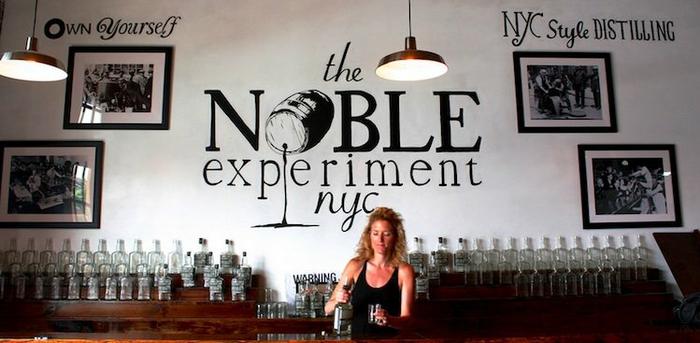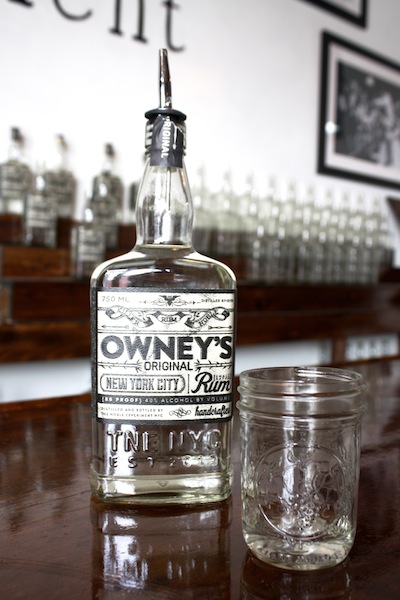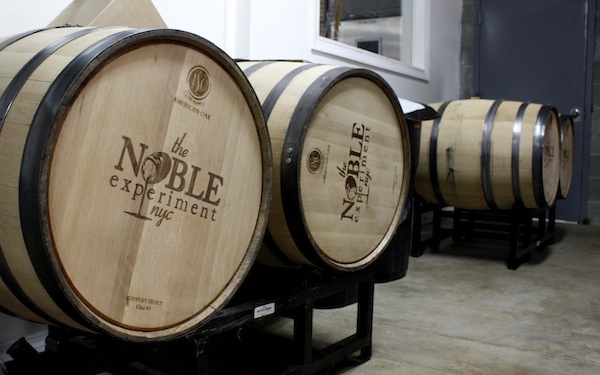
We hear a lot of interesting stories from career changers here at The Muse, from women who left their desk jobs to become DJs to a former analyst who now spends her days running a cupcake shop. But with my love of all things bottled and boozy, I knew I had to learn more when I heard about Bridget Firtle’s story.
After having a successful early career in finance, Bridget decided to leave it all behind and start her own craft rum distillery, The Noble Experiment. The change required a lot of sacrifices—including giving up her fancy TriBeCa loft to move back in with her parents—but for Bridget, they’ve all been worth it in order to create something she’s so excited about.
I went to visit Bridget at her beautiful facility in Brooklyn to talk to her about what made her take the leap, how she’s learned the craft of distillation, and what advice she has for other people with a burning passion to make a change.
Oh, and to taste some of her delicious rum.
Let’s start here: What made you decide to open a rum distillery?
I was working for a hedge fund as part of its consumer staples team. About a year into it, I stumbled across a stock for a beer manufacturer, and ultimately kind of landed myself as a global alcoholic beverage analyst. I spent about four and a half years researching and investing in globally traded beer, wine, and spirits companies. Over time, I just developed a huge passion for the people behind handmade stuff and the research that’s in craft beer and vineyards domestically and internationally.
I always wanted to own my own business, but I thought it would be in finance because that’s what I jumped into in school. I was evaluating my next move in finance to get myself to the place where I could open my own financial institution, and I was really hoping to get into venture capital just because new business excited me. And then I realized that I didn’t want to be on the outside looking in anymore—I really wanted to get my hands dirty and own my own business.
Really, the motivation behind the idea is to incorporate the history of rum distillation in the Northeast. It was the first spirit we actually distilled in this country, and I want to help bring it back and make it as distinctive to this space as possible. So we’re using three ingredients: New York tap water that’s been filtered, molasses from sugar cane farms in Florida and Louisiana, and our proprietary yeast strain. All the processes are done here and the aged stuff, when it’s ready to be released, will be aged here.
How did you learn the craft and technical skills involved in distilling spirits?
I was very self-taught. I’m really naturally math and science oriented, so when I decided I was going to do this, I spent about a year studying on my own while I was writing the business plan and trying to get money. I read everything I possibly could on fermentation science and distillation science, and I continue to read as much as I can. There’s a great book that’s pretty technical called The Complete Distiller—it’s the best resource that I’ve found.
I also visited as many small distilleries as I could drive to in New York and took a trip out to Kentucky to visit the big bourbon guys there and pick their brains. Then once we were finishing construction, I spent the first two to three months doing a trial and error process to get to the final outcome.
Education is a conundrum in the industry in general right now. Domestic distilling has been nascent since just prior to Prohibition, and it’s just coming back. While the smart thing to do from a business standpoint would be to hire a distiller or hire someone to consult with, those people hardly exist in this country. There’s no formal education—you can’t get a degree in brewing and distilling. I would say 90-95% of small craft distillers these days have no background in it. They’re all self-taught.
But a lot of distillers around the country are very much willing to share their methods. I happen to be very transparent about how things are done. That’s not going to teach you how to do everything, but every little bit helps.
What advice do you have for something thinking getting into craft distilling?

I would say that often times this looks a lot more glamorous from the outside than it does from the inside. It’s a really fun industry to be in; however, it’s difficult to build a business given the regulations that prohibit the industry and the competition with the big brands that have so much money behind them.
It is an extreme hustle, especially in the beginning as a small person; you don’t have the resources that the large companies have, you are literally hand selling every bottle in the beginning to build the brand. And I think that people underestimate that—I think I underestimated that to an extent. People should try and evaluate that before they sink everything they have into something.
What has been the hardest thing about making the switch from a regular job with a paycheck to starting your own venture?
I think you hit the nail on the head—you’re getting a paycheck every two weeks. You have health insurance. And I happened to be in a ridiculously cushy job where I was getting paid a lot of money as a young person.
There’s nothing I can say that can explain the transition to being fully accountable for yourself and your company and then for investors. And while it’s extremely empowering—I’m in control, I have nobody to blame but myself—it’s a completely double-edged sword. It’s challenging in that you don’t have that guaranteed payment and you don’t know when you’re going to have that again.
That can cause a lot of anxiety, and if you harp on that it can become paralyzing. So you just have to keep moving forward and striving to get better, and achieve your goals in a different way.
What advice do you have for something thinking of making a major career shift like this?
I would 100% encourage somebody to do this. The amount that I have learned in the past two years—writing a 30-page business plan with financials, sourcing money, figuring out how I’m going to fund something, getting the licensing required, drawing up legal documents for the business, actually working with an architect to build the space, filing with the city, managing contractors—is irreplaceable. Doing it all yourself is the most empowering feeling.
I was completely inspired to do this. That feeling was like nothing’s going to stop me. If you have that feeling—if you have that passion for something—you will succeed.
Alright, let’s finish up with a fun one: What’s your favorite way to drink rum?
I’m generally kind of a purist when it comes to drinks, so I drink it on ice with a slice of lime or just on ice, but I understand that most people don’t like to do that. My favorite suggestion right now is a Daiquiri.
When I first started telling people this, they were shocked—this woman just went through this whole spiel about how she makes and cares about the rum and now she’s telling us to take a box of sugar and pour it into a blender?
But really, a traditional Daiquiri is just fresh lime juice, simple syrup, and rum, shaken and served up. And it’s arguably the most classic, well-balanced cocktail you can get. It’s pretty timeless, it’s delicious, and you can easily re-create it at home.
Learn more about The Noble Experiment or find out where you can try some of Bridget’s rum at tnenyc.com.
